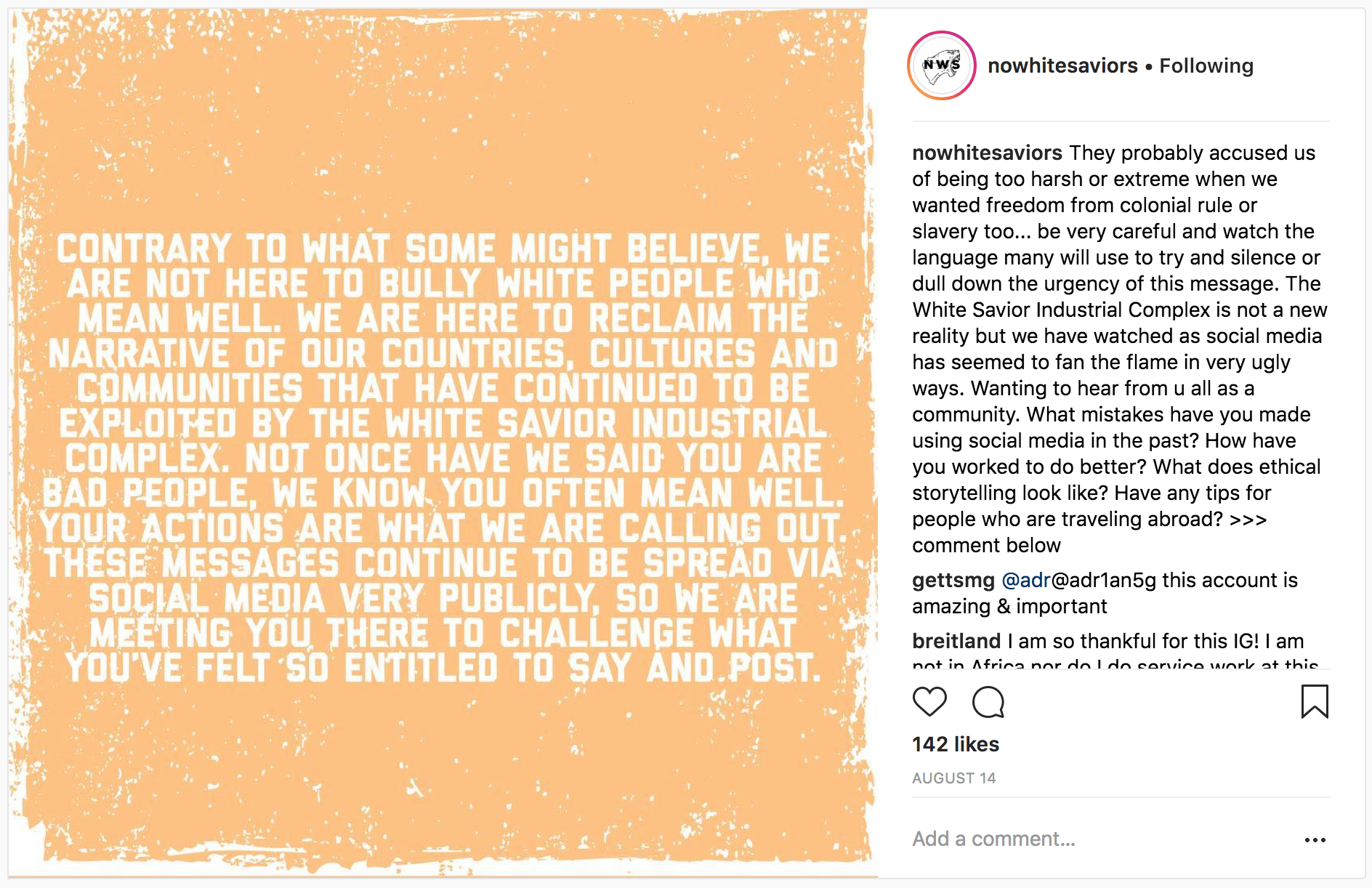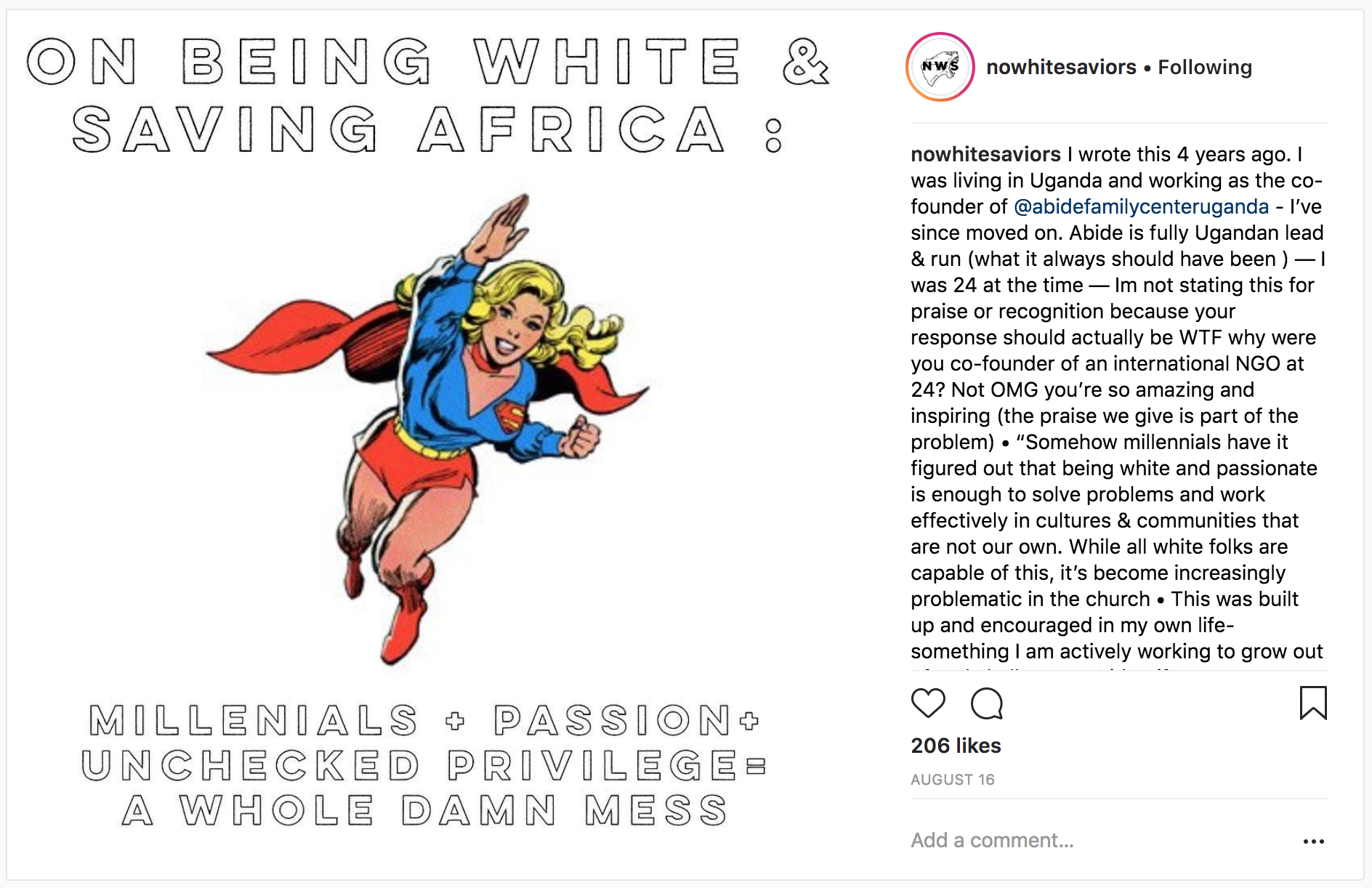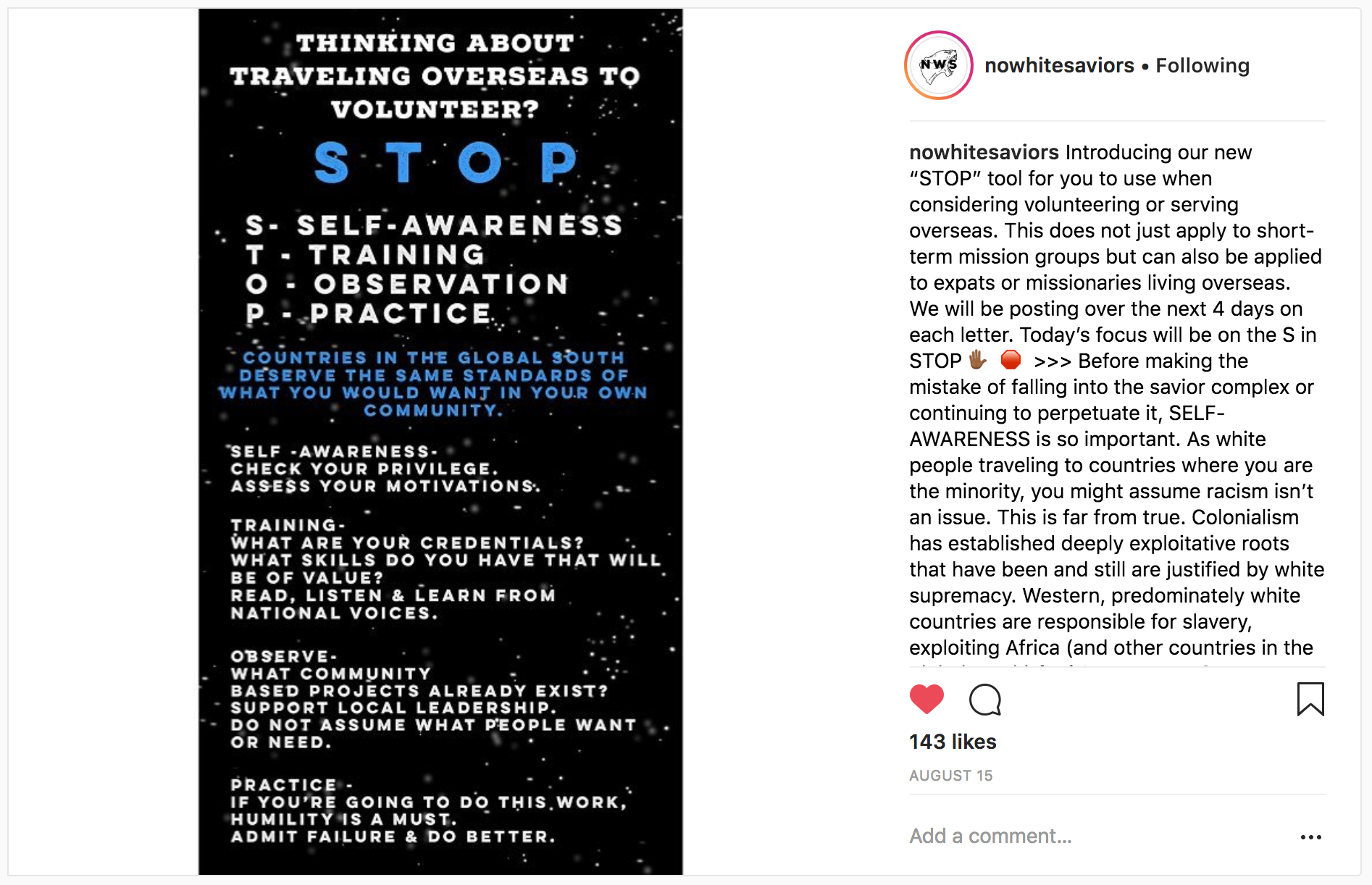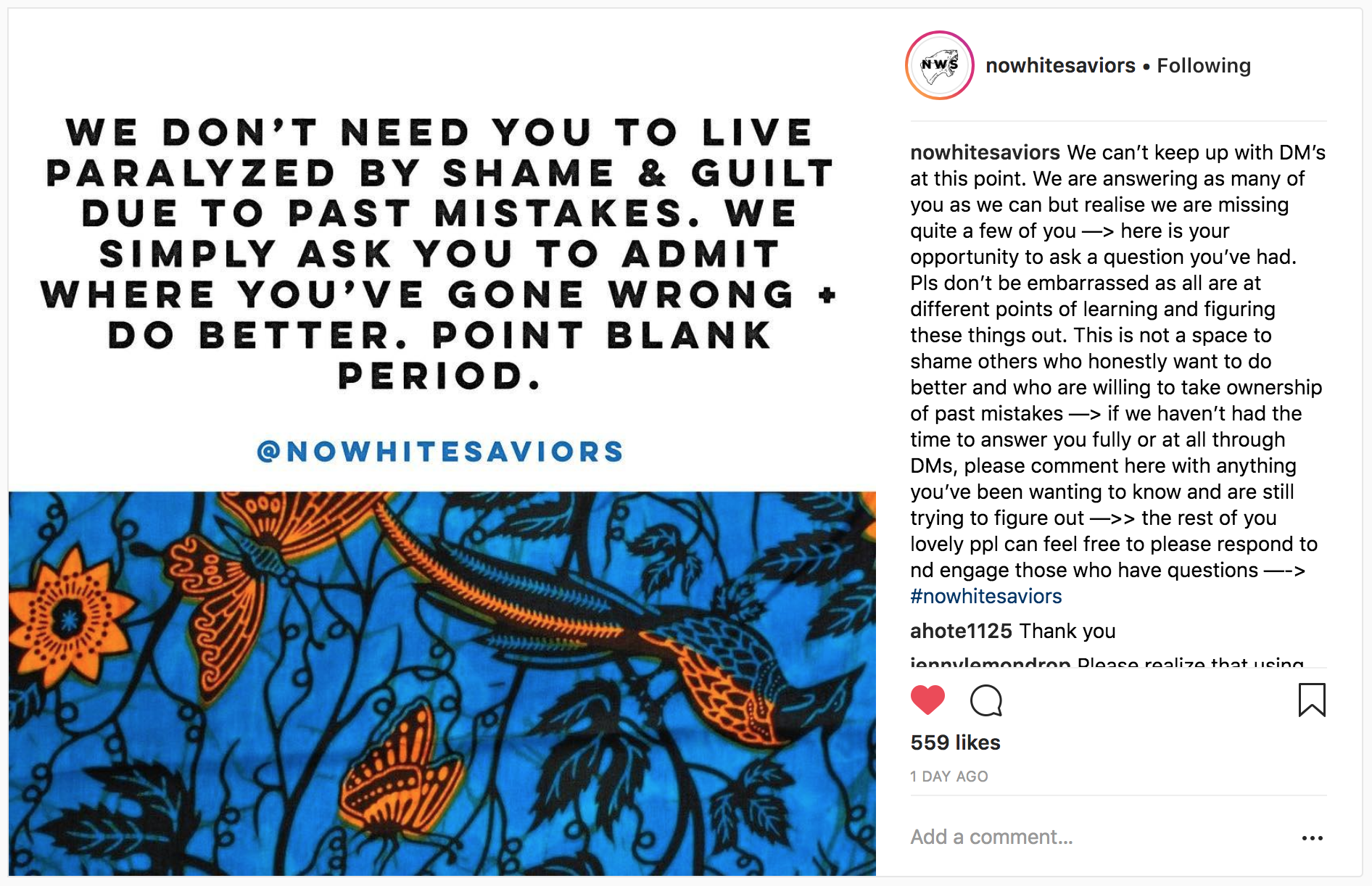I recently came across an Instagram account called @nowhitesaviors, run by a collection of people from Uganda, Kenya, USA, etc. (some are anonymous). I spent the following two hours browsing their content and comments and going down the rabbit holes of articles they referenced, accounts they hope to educate for their hazardous actions, as well as accounts they support for their ethical storytelling and advocacy.
"The White Savior Industrial Complex is a valve for releasing the unbearable pressures that build in a system built on pillage."
- Teju Cole, The White-Savior Industrial Complex on The Atlantic
Even though this account was a recent discovery, the concept of the white savior [industrial] complex is something I’ve come across many times in the last few years. Not just while writing my book that touches on this issue but while reading travel literature, watching movies, and discussing with traveling, international students the ethics of volunteering, voluntourism, and using media to capture exchanges with people around the world.
When I started writing my book, I thought it would focus on a double narrative about my experiences in Fiji and my terminally-ill grandmother that inspired me to take the trip.
I didn't just want it to be a travel narrative for people interested in the destination. I thought my story would merge travel with something that hit closer to home.
I didn’t just want it to be about a failed project that I started. A shame story more fit for my diary.
And I believed it wasn’t as simple as a white savior narrative, if simple is the right word to use here.
I invited two people to join me in Nakavika, a move I didn't realize at the time was irresponsible.
I initially thought themes of race and the white savior complex weren’t relevant to my story, because my intention for returning to Fiji weren't faith-based nor to “save the children” (at least not explicitly or knowingly). There were other factors at play, I thought. I was prematurely grieving. I felt useless. I liked a guy. And I was reeling from a sensation of feeling out of place in my home culture, from feeling disconnected to the thoughts and practices of people in my various “home” communities. I didn't know how to process a multi-year bout of reverse culture shock.
And I was invited to Fiji. I was made to feel completely welcome from the start by the upper rungs of the village hierarchy. And by the children themselves.
With each new discovery in my research—such as @nowhitesaviors and Suzy Hansen’s Notes from a Foreign Country—my editing gets closer to the core of what really happened in Fiji: internally within me, subterraneously within the village, and existentially within all of us in relation to the greater narratives of which we all unavoidably are a part.
I’m convinced that as one writes a nonfiction narrative about personal experience, one feels it in their bones when the story is starting to cover the truth, rather than missing the point or skirting the main issues. Now that I’ve got what happened on paper, I’m seeing why it happened more clearly.
And the why is, of course, the real reason why we write. And read.
The face of someone sorting through complicated emotions
Quite late in that Fijian trip, I came to the realization that perhaps I was throwing around my weight in ways that could cause more harm than good, the opposite of my intended impact. Sixty days into an eighty day trip, I learned the term “cultural imperialist” from a backpacker at a bar who delivered a gift to me, in the form of a hard but necessary statement.
That day, I dropped into an emotional and intellectual pit in which I grappled with my intentions, started dissecting them for root causes, challenged my fingers to write the hard questions to myself (and to the community I visited and still chat with today via Facebook Messenger) that would help me face my own humanity and find a way out of this self-obsessed pit.
Eight years later, I’m still teaching myself about history, foreign policy, identity in relation to nationalism, "background," and the lexicon necessary to frame cross-cultural exchanges and exist ethically in a multicultural world. Every day I get frustrated with myself for being so slow to the party—the party being a euphemism for a realistic understanding of power and privilege in our globalized world, for the sea of thought-leaders and social justice warriors who have been stating their truth in other channels but the ones into which I tuned.
My ignorance wasn’t intentional, but I still have to be accountable for it.
With Emma and Vosita on my first trip to Nakavika © STA Travel, 2009
What I have concluded is that I objectively, undoubtedly contributed to the white savior narrative that persists in the twenty-first century from years of imperialistic exploits, both in Fiji and in earlier trips to South Africa, India, and Cambodia. However, I also think it’s worth telling my Fiji story and interweaving all the other narratives that were at play: family/legacy/grief, implicit bias, Americanism, privilege, race status exchange, education, cultural exchange/ignorance/clashing, and more.
Tropes can feel simplified or binary. I think it's easy to convince yourself that you are an exception because of unique, extenuating circumstances. Of course, that's one of the reasons I really enjoy reading and writing: one can pinpoint with words the complexities of one exchange ...within trillions of exchanges in an already complex and vast universe.
The more I work on this manuscript, the more I attempt to capture how complex we humans are and how much each of us has to learn.
I write blog posts like this for a couple reasons:
I need to write things down with an audience in mind to organize my thoughts/feelings. Thanks for helping me out with that one.
Some of my former students are curious about this new life path of mine and when I’ll finish this multi-year project of writing a manuscript. And in this way, I can’t stop being an educator.
I am looking to continue educating myself and others like me who may still be isolated from these types of challenges to their status quo.
I want to attract people smarter than me to learn from them, to read more articles, learn more concepts, support just causes in line with my values, and continue finding my path forward.
If you’re still reading this and you know of other thought-leaders and advocates (possibly yourself!) who could speak more to these issues, I am all ears! Please comment below or on my Facebook page.
In the meantime, I’m going to keep digging into this criticism of white savior narratives and work to make my own book something of value to this conversation. Wish me luck.
"All of this takes us rather far afield from fresh-faced young Americans using the power of YouTube, Facebook, and pure enthusiasm to change the world. A singer may be innocent; never the song."
- Teju Cole, The White-Savior Industrial Complex on The Atlantic







